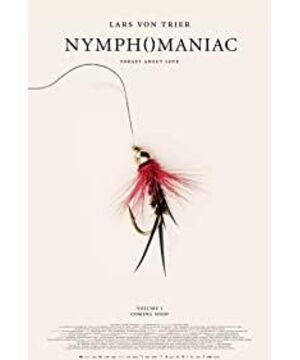First of all, thanks to my favorite Xiao Shi for the recommendation——
A chapter-length film, with two-line narration, forms some ingenious connections between the interlude and the main narration to achieve the purpose of metaphor, and also endows the whole erotic film with a strong poetic sense: mathematics (Fibonacci sequence), plants (white wax) tree), religion (discussions on original sin), music (Bach), literature (Earling Poe)... Let me start with my most subjective, first talk about sex and love in women's emotions.
1. Fishing and sex - the reversal of the male standard.
In the first chapter, Ryras von Trier compares the means of seducing men to fishing. In popular Chinese, such metaphors seem to abound: something like "casting a wide net and re-fishing", "raising fish", "sea king" and so on. In East Asian societies, it is not difficult to find that men are often the "fishers". In a culture of social misogyny, all subconsciously prioritize women as a victim: you have sex with a new guy = you don't value your body = you're at a loss. What do women suffer from? Going down the logical line, the foothold has returned to men - you may be despised and disliked by future/potential partners. A naked slut humiliation. In the patriarchal society, the process of women is cruelly omitted; the pleasure, orgasm, passion, and pleasure that women experience in sex are all shamefully ignored; there is only one result: you have been fucked by men. "Female Addict" is a complete subversion of such a view. Through the process of fishing, men and women are reversed, giving women a sexual right, and sex can also be a woman's game.
Second, the separation of sex and love.
Aside from the proclamation of women's sexual rights, Lars von Trier also has an anti-bone spirit of love that fascinates me. In the whole erotic film I attach the most importance to the idea: the rebellion against love. Perhaps the best answer to sex addiction is this: It's a revolt against a world where love comes first (like doing the stupidest thing in "Notes from a Basement" to show disdain for reason). Sex and love are completely separated in the movie. Despite the horrifying close-ups of the genitals, the cries and gasps of orgasm, such a depiction of pure sex is cold, alienated, dry - pure sex is a means, and We eat and sleep the same way. "The secret of sex is love." Only love can bring about sexual passion. But love is abominable in Joe's eyes (and mine). In the second chapter, back to Jerome, she says, "I wanted to be one of Jerome's things. I wanted to be picked up and put down again and again." In love, we objectify ourselves, tragically deliver The subjectivity of the self and the desire to be the possession of others. As Sartre said, in a romantic relationship, there must be one person who is the ultimate sadist and the other who is the ultimate masochist. The deeper the love, the more "abusive" relationship between the two parties. In love, people always become pitiful and vulnerable. After realizing this clearly, I will experience a kind of tragic beauty soberly, and then seek resistance - sex, the weapon against love (I think this is a bit like "Love in the Time of Cholera"). In the chapters of "Mrs.H", we can also experience the hateful nature of love, as well as a responsibility imposed on love—the so-called relationship between family and ethics. In a passion for love that transcends reason, we ask for the infinite, but the human being, together with human desire, is always limited. Intense contradictions burst into dazzling sparks.
View more about Nymphomaniac: Vol. I reviews











